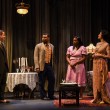As spring transitions into summer, there is fresh, inventive theatre quietly sailing into the New York off-Broadway theatre scene.
The Masterworks Theatre Company, headed by Eric Krebs and Christopher Scott, who serve as founding director and artistic director respectively, aims to provide “an accessible experience for new audiences” and for these people, especially those in high school and college, to be introduced to prominent works of theatre “that every young person should have the opportunity to experience.” Masterworks’ inaugural production, a non-traditionally-cast version of Tennessee Williams’s American classic The Glass Menagerie that began previews on May 8 and officially opened May 14, successfully delivered to their mission statement by offering a refreshing, unpretentious take on a widely-produced theatre staple.
The Glass Menagerie centers around the life of Amanda Wingfield (Saundra Santiago) and her two children, Tom (Richard Prioleau) and Laura (Olivia Washington). Amanda, a woman abandoned by her husband, is a former Southern belle, whose wealthy upbringing has all but faded into the past. Meanwhile, Tom is a frustrated, unsuccessful writer who shoulders the responsibility of being breadwinner to his family. His sister Laura, beautiful but shy, feels isolated from the world due to a limp and a strong inferiority complex, both of which physically and mentally put a burden on herself and ultimately, on Amanda and Tom. The hope is that Laura can be married off to a fine gentleman so that their faded past and their unfortunate present can lead to a more hopeful future.
Menagerie’s most recent revival on Broadway in 2013 received great acclaim and numerous accolades, including seven Tony Award nominations, but even though it played in one of the smallest Broadway houses (the Booth Theatre, at 766 seats), there was a necessary intimacy lacking from that particular production. The entirety of the play takes place inside the humble Wingfield household, and it can be difficult to project the closeness and tenderness of the relationships onstage to a house of 766. In contrast, inside the 47th Street Theatre, a narrow, converted firehouse with exposed brick walls and a more realistic, to-scale playing space onstage, we are easily dropped into the story.
All actors portray their timeless characters with great finesse, from experienced actors such as Santiago to actors making their New York theatrical debut, such as Washington. Santiago portrays Amanda with a great sense of rationality and commanding energy; she regularly stumbled on lines throughout both acts, yet oddly, it only added an interesting fragility to her character, who grew more on-edge with each scene. Olivia Washington and Richard Prioleau as the two adult children balance each other out splendidly, her meek but infectious demeanor juxtaposed with his go-getting passion and spirit. Both actors perhaps gave a little too much physicality in their portrayals that was ultimately a bit distracting for how intimate the space was, but nonetheless, the audience is with them the whole way through. Doug Harris as Jim O’Connor, the Gentleman Caller, does a convincing job with the less-than-substantial role he is given.
The Glass Menagerie is a story of memory, of love, but above all, it is a story about the American family. A lot is different now, however, in 2015 than in 1944, when the play first premiered, including what it means to be American. Harkened by changes in ideals, beliefs, and demographics that have immensely expanded the scope of possibility for what a story of family can be, and in reflection of the changes that have overhauled the cultural and racial fabric of this nation in the last 60 or 70 years, Masterworks’ production of The Glass Menagerie does a small part in refining the representation of Americans on the American stage today, a small stepping stone to a theatre more reflective of the diverse nation America has become. Race is never mentioned in the play, and yet, in simply producing an American classic almost universally done with all white actors with actors of multiple backgrounds, Masterworks brings a fresh perspective on what an American family can be, and what American theatre can be.
Photo Credit: Russ Rowland















